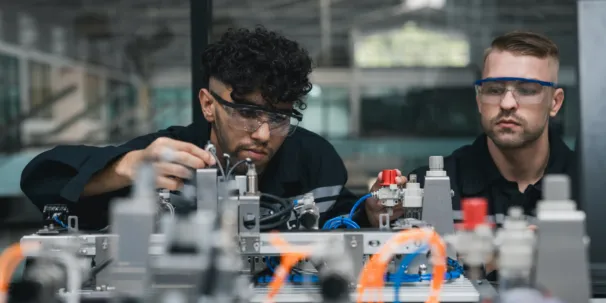What Can You Do With an Engineering Degree?
Curious about what you can do with an engineering degree? Find out all you need to know about career paths for engineering graduates in this article.

Engineering is more than just fixing machines and building bridges; it shapes the future. The engineering field encompasses a range of disciplines, from mechanical and civil engineering to electrical, chemical, and beyond. It’s about applying scientific principles to create solutions that improve our lives, whether through developing sustainable energy sources, designing efficient transportation systems, creating new medical technologies, or revolutionising communication.
Any successful engineering career is likely to start with an engineering degree. FutureLearn offers many interesting and accredited online engineering degrees, giving you the flexibility and convenience to achieve your career goals while balancing your other commitments.

Career paths for engineering graduates
Engineering is a vast field, meaning there’s a job for everyone, whether crafting integral infrastructure, designing eco-friendly buildings to promote a greener planet, pioneering technological advancements, or enhancing healthcare services. Whatever your interests are, engineering provides a fulfilling path tailored to your aspirations.
What are some of the specific roles you can get with an engineering degree? Here are just a few:
Civil Engineer
Civil engineers play a pivotal role in the planning, design, and maintenance of essential infrastructure projects, including roads, bridges, and buildings. They are the architects of our modern world, ensuring our communities thrive because of safe and efficient structures. Their salaries range anywhere between £30,000 to £57,000 a year.
Mechanical Engineer
Mechanical engineers conceptualise, design, and oversee the production of various mechanical systems and devices. From automobiles to industrial machinery, they ensure that products are functional, safe, and efficient. Proficiency in engineering principles, CAD software, and problem-solving skills are essential in this role. These engineers can earn £26,000 and £52,000.
Software Engineer
Software engineers are the architects of our digital age, crafting the apps, systems, and platforms that power our world. They’re not just coding wizards, though; they’re problem solvers, innovators, and collaborators extraordinaire. From writing lines of code to conducting rigorous testing, software engineers work tirelessly alongside diverse teams to ensure top-notch solutions. Their knack for programming languages, problem-solving, and a passion for staying ahead of the tech curve, makes them a driving force behind our digital evolution. Software engineers can make between £45,000 and £70,000.
Environmental Engineer
Environmental engineers are the eco-warriors of our time, on a mission to safeguard our planet and create a greener, more sustainable future. From combating air and water pollution to revolutionising waste management practices, environmental engineers lead the charge toward a greener tomorrow. Armed with sharp problem-solving skills, a deep understanding of environmental regulations, and an unyielding commitment to sustainability, they drive forward environmental progress. They can earn £30,000 to £55,000 each year. They use their skills to solve problems like pollution and help keep our planet clean.
Electrical Engineer
Electrical engineers are the minds behind designing, developing, and testing the electrical systems and equipment that power our modern world. They may spend their time designing schematics, troubleshooting technical issues, or collaborating with colleagues to bring projects to fruition. Whether they’re fine-tuning circuits or conducting experiments in the lab, every day presents new opportunities to make impactful contributions to the field of electrical engineering. If they do their job right, electrical engineers can earn £27,000 to £58,000 a year.
Aerospace Engineer
From conceptualising new aircraft designs to ensuring compliance with safety and performance standards, aerospace engineers play a pivotal role in advancing aviation and space exploration. They combine their expertise in engineering principles, physics, and materials science to create innovative solutions for the aerospace industry. A keen eye for detail, strong analytical skills, expertise in computer-aided design (CAD) software, and a passion for pushing things forward, are what help Aerospace Engineers earn upwards of £60,000.
Chemical Engineer
Chemical engineers design and optimise large-scale chemical processes for the production of various materials, from chemicals to pharmaceuticals. They leverage their expertise in chemistry and engineering to ensure efficient and sustainable manufacturing, helping many organisations meet industry standards. If you’re thinking of becoming a chemical engineer, you can expect to earn between £30,000 and £65,000 annually.
Biomedical Engineer
Biomedical engineers design medical equipment and devices, applying engineering principles to healthcare. They often work with medical professionals to develop innovative solutions to better patient care. If you’re interested in this type of engineering role, you’ll need excellent problem-solving skills, be detail-oriented, and have a passion for improving healthcare outcomes, biomedical engineer salaries range from £25,000 to £50,000.
Systems Engineer
Systems engineers are responsible for designing, implementing, and managing complex systems across various industries. They analyse requirements, develop system architectures, and oversee the integration of subsystems to ensure efficiency for everyone. Systems engineers earn between £30,000 to £60,000.
Nuclear Engineer
Last but certainly not least, nuclear engineers, who can earn between £30,000 to £60,000, work in one of the most fascinating and impactful fields of science and engineering. Specialising in the research, design, and operation of nuclear systems and technologies, they have the opportunity to work on a variety of tasks, from reactor design to nuclear waste management.

Advance your engineering career with FutureLearn
FutureLearn offers online engineering degrees, making your engineering career feel much more accessible. Our platform empowers learners to tailor their education and delve into specific areas of engineering they’re passionate about. Each programme blends theory with practical applications, providing a comprehensive learning experience. By the end of each degree, you’ll feel confident to land your next engineering job and make an impact on the world!




